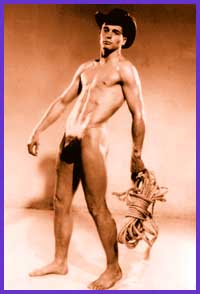“It was a simpler time; things were so much easier, then,” says a former physique model near the start of Beefcake, Thom Fitzgerald’s new feature on the Athletic Model Guild, Los Angeles’ (queer) dream factory of the post-World War II period.
Historians may not agree that the ’50s were simpler and easier, but those years do continue to provide ’90s gay audiences with fodder for the most enduring myths of our past. Beefcake is all about the obsession with the ambiguous straight man who might or might not give his heart, and maybe even his body, and about processing that obsession through art.
Granted, the glossy nude photos and leering movie loops that AMG’s Bob Mizer produced for a living weren’t exactly high art, but this “sleaze” is also part of the mythology, a longing for the abjection of yore, before respectable gay-niche marketing removed the taboos, the intensity and the secrets from our lives.
Postwar beefcake constituted the golden era of gay visual culture, and director Thom Fitzgerald (of The Hanging Garden fame) creates a movie that goes a long way toward backing up this claim. The movie is, among other things, an archeological dig and a celebration, crammed with montages of the glowing stills and the mail order movies that shaped the generation then emerging wanking into the daylight.
One of Fitzgerald’s triumphs is his virtuoso intercutting of the vintage materials with his ’90s narrative, much of it exquisitely reconstructed in period style. It’s a pomo gimmick, yes, but somehow faithful to the lingering mark of ’50s sensibilities.
Mizer is famous for excess; his distinctive childlike overripeness exemplified the conscience and imagination of the era. Fitzgerald shows us how. Beefcake is narrated by Mizer’s idiosyncratic run-on editorials from his legendary catalogue mag Physique Pictorial, thus reviving one of the few voices of courage and unapologetic lust in that age of cowardice and scapegoating.
Fitzgerald’s second objective is an oral history. He interviews seven of the original photographers and models, plus one pop historian. Veteran San Francisco photographer Dave Martin’s candour and understated self-fulfillment steal this part of the movie. His thick, twinkling eyeglasses seem to stand in for the visual eroticism that has come to be at the centre of our heritage.
Otherwise, the oral history pales beside other films like Word Is Out and Forbidden Love, and certainly can’t compete with Mizer’s original stroke materials themselves. Ranging from the boringly banal to the offensive, the lineup includes several well-preserved models scrambling over each other to trumpet their latter-day “maturity” and heterosexuality.
Joe Dallesandro, in a brain-dead appearance (very expensive, I’m sure), has the nerve to brand the reckless prophet who made him what he is a scuzzbag. Admittedly, denial, half-secrets and self-justification were what the pre-Stonewall culture of unlabelled same-sex interaction were all about. But when the scuzzbag publicists from Atlantis Alliance join in on this de-gaying of the phenomenon and the movie (mendaciously emphasizing the role of women as beefcake customers, for example, and removing all the “G” words from the synopsis that hack reviewers are going to reprint), I started wanting a little old-fashioned post-Stonewall gay pride thrown in as well.
I agree it’s important for expensive gay movies like this one to move beyond the ghetto, but success stories like Taxi To The Toilet and Lilies do it through in-your-face integrity, not disavowal.
There’s another movie in Beefcake, alongside the visual archeology and the oral history – the Mizer biopic that Fitzgerald reportedly discovered while developing the film. Everyone’s favorite gay Toronto actor, Daniel MacIvor, delivers another sterling performance as the artist torn between his camera and his ashamed but complicit mother (Carroll Godsman).
The biopic climaxes in a courtroom drama where Mizer and his circle are basically convicted of running a hustler ring. It’s a powerful scene that uses the transcript of the original trial to uncanny and original effect, merging history with melodrama.
Less successful is another subplot involving a Nova Scotia hayseed who makes it big as a Hollywood physique model. Buff ’90s actor Josh Peace is miscast and flounders about in a Canadian angle that seems strapped on.
Like the AMG products it explores, Beefcake can be wildly incoherent, absolutely ecstatic and true at the same time. And as a bonus, it adds the traditional Canadian ingredient of an ironic and distanced view of US pop media.
So let’s help the publicity and leak the taxpayers’ investment in Beefcake to the Reform Party MPs who are still out for the blood of lesbian pornographers. After all, Reformers are still living in the simpler and easier times that Beefcake so brazenly unveils and might actually enjoy all the denial.
Beefcake opens on Fri, Jun 18 at the Carlton (20 Carlton St) and Canada Square (2200 Yonge St).
Tom Waugh is author of Hard To Imagine, a history of pre-Stonewall gay erotica.

 Why you can trust Xtra
Why you can trust Xtra


